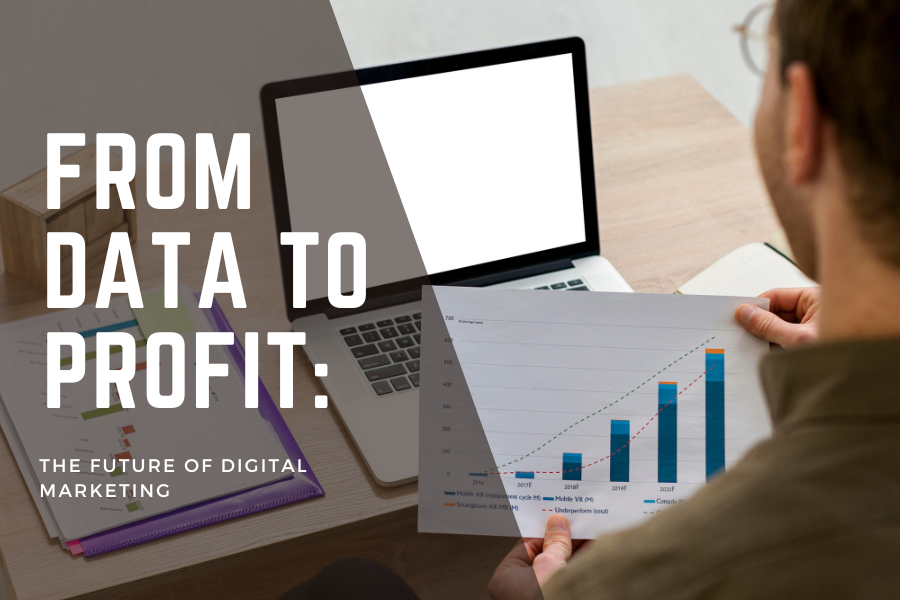From Data to Profit: The Future of Digital Marketing
Data-driven marketing has been in the digital marketing scene for some years now. It is a growing trend which will gain unprecedented momentum in the coming years. It helps make important decisions in an informed way thus, helping save on costs and gain targeted profit. Data plays a heavy role in determining the outcomes of marketing. It aids in making strategies by examining performance and analysing customer behaviours.
From optimising campaigns to personalising customer interactions, data-driven digital marketing is the forerunner to successful media campaigns and profitable businesses in the digital world. This method allows marketers to create effective strategies according to data analytics about customer behaviour, preferences and market trends.
What are the Key Elements of Data-Driven Marketing
Data-driven digital marketing has several components which are as follows:
1.Data Collection
Customer data, performance data and market data are all collected in this segment. From customer demographics to behaviour and preferences, customer data forms the backbone of the digital marketing industry. Moving to performance data, click-through rates, conversation rates and ROI are tracked. Finally, market data tracks market trends, deep industry benchmarks, and competitor strategies. This data is extremely useful and indispensable for the digital marketing sector to produce optimum results.
2.Analytics and Insights
Descriptive analytics helps in understanding what happened in the past through historical data. Predictive analytics forecasts future trends and customer behaviour using statistical models and machine learning. And, prescriptive analytics recommends actions based on the insights to achieve desired outcomes.
3.Personalisation
This step helps in creating customised content based on individual customer likes and preferences along with having a targeted customer base. It helps deliver targeted messages to specific audience segments bringing positive responses and outcomes. This aids in creating a positive image among customers.
4.Optimisation
One can continuously monitor campaign performance to make adjustments in real-time and test different marketing assets like ads, email, social media, etc to see which works better. This is useful in optimising the campaigns and getting the best results with minimum costs.
5.Automation
Automation tools can be used to perform repeating tasks like emails, posts, and ad campaigns. AI and machine learning can be used for creating personalised content and decision-making processes.
What are the Benefits of Data-Driven Digital Marketing?
There is a multitude of benefits of data-driven digital marketing. From improved accuracy to higher ROI, leveraging the power of data and integrating it into digital marketing is the next big thing in the digital marketing industry.
Data facilitates making informed decisions and helps reduce guesswork. As a result, it allows for more accurate targeting and messaging. It optimises campaigns and facilitates businesses to achieve better results without spending much. With this, one also gets an enhanced customer experience through personalised interactions and content improving satisfaction and loyalty. Data ensures a faster decision-making process in digital marketing as well as scalability since real-time insights help in making quicker adjustments.
Tools for Data-Driven Digital Marketing
There are various high-power digital marketing tools that are accessible as well as affordable.
Google Analytics: This provides insight into user behaviour and traffic.
CRM Systems (Salesforce, HubSpot, etc.): These help manage customer relationships and interactions.
Marketing Automation Platforms: Platforms like Marketo and Mailchimp automate and optimise marketing tasks and campaigns.
Social Media Analytics Tools: They help in analysing social media performance and audience engagement. Examples: Hootsuite and Sprout Social.
Finally, Why is Data-Driven Digital Marketing Important?
1.You Get Enhanced Customer Insights
Personalisation and segmentation of customers help in getting accurate customer insights. Data allows marketers to understand individual customer preferences and behaviour. Further, marketers can segment their audience into various groups based on their interests, preferences, demographics, and behaviours allowing for the creation of personalised marketing campaigns.
2.Improved Decision-Making
Data provides important information in real time to make quicker and more accurate decisions. Since marketers are able to understand what works and what doesn’t, this helps in optimising strategies. Data also helps marketers predict future trends and customer behaviour ensuring that they stay ahead of the competition.
3.Increased Efficiency and ROI
Resource allocation is greatly improved with data-driven digital marketing by identifying the most profitable channels and strategies, reducing marketing costs. Through performance tracking, the returns on investment can be optimised.
4.Enhanced Customer Experience
One can improve customer satisfaction and loyalty by being present on multiple channels at the same time with consistent brand messages.
5.Competitive Edge
Data analysis helps marketers stay informed about the latest trends in the market and access to detailed data allows for innovation.
6.Measurable Results
Data-driven digital marketing enables accountability with clear metrics and it allows for the tracking of key performance indicators which makes it easier to measure success and identify areas of improvement.


Okay, 115bet, let’s see what you’ve got. Another betting site to try my luck on. Fingers crossed! 115bet